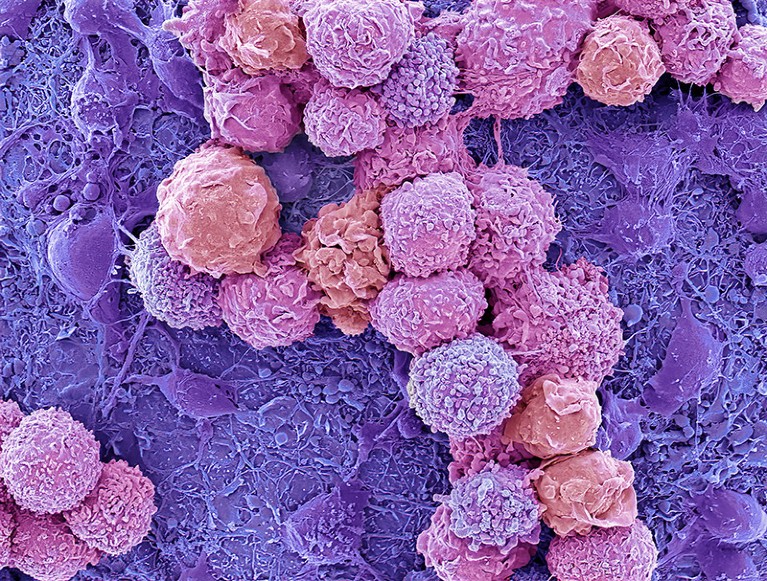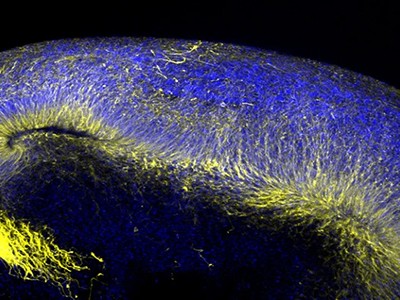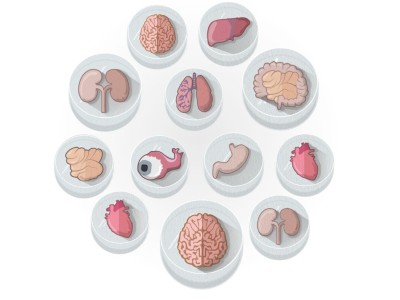
A part of a mind organoid, by which stem cells (pink) are differentiating into neurons (purple).Credit score: Steve Gschmeissner/Science Photograph Library
Researchers have constructed a hybrid biocomputer that mixes a laboratory-grown human mind tissue with typical circuits, and may full duties comparable to voice recognition.
The expertise, described on 11 December in Nature Electronics1, may someday be built-in into artificial-intelligence (AI) techniques, or type the idea of improved fashions of the mind in neuroscience analysis.

Organoids open contemporary paths to biomedical advances
Researchers name the system Brainoware. It incorporates mind organoids — bundles of tissue-mimicking human cells which can be utilized in analysis to mannequin organs. Organoids are constructed from stem cells able to specialising into several types of cells. On this case, they had been morphed into neurons, akin to these present in our brains.
The analysis goals to construct “a bridge between AI and organoids”, says research co-author Feng Guo, a bioengineer on the College of Indiana in Bloomington, Indiana. Each AI and the mind depend on passing indicators round an online of interconnected nodes, generally known as a neural community. “We needed to ask the query of whether or not we are able to leverage the organic neural community throughout the mind organoid for computing,” he says.
Harnessing brainpower
To make the Brainoware system, researchers place a single organoid onto a plate containing 1000’s of electrodes to attach the mind to electrical circuits. They then translate the knowledge they need to enter right into a sample of electrical pulses that they ship to the organoid. The mind tissue’s response is picked up by a sensor and ‘decoded’ utilizing a machine-learning algorithm that may establish the knowledge it pertains to.
To check Brainoware’s capabilities, the workforce used this system to do voice recognition by coaching the system on 240 recordings of eight individuals talking, translating the audio into electrical to ship to the organoid. The mini mind reacted in a different way to every voice, producing a distinct sample of neural exercise. The AI discovered to interpret these responses to establish the speaker. After coaching, the system may establish voices with an accuracy of 78%.
Though rather more analysis is required, the research confirms some key theoretical concepts that would finally make a organic laptop attainable, says Lena Smirnova, a developmental neuroscientist at John Hopkins College in Baltimore, Maryland. Earlier experiments have proven solely two-dimensional cultures of neuron cells to have the ability to carry out related duties, however that is the primary time it has been proven in a three-dimensional mind organoid.
Higher mind mannequin
Combining organoids and computer systems may permit researchers to leverage the pace and power effectivity of human brains for AI, says Guo.

The increase in mini stomachs, brains, breasts, kidneys and extra
The expertise is also used to check the mind, says Arti Ahluwalia, a biomedical engineer on the College of Pisa in Italy, as a result of mind organoids can replicate the structure and performance of a working mind in ways in which easy cell cultures can’t. There may be potential to make use of Brainoware to mannequin and learning neurological problems, comparable to Alzheimer’s illness. It is also attainable to check the results and toxicities of various therapies by seeing how the organoids react. “That is the place the promise is; utilizing these to someday hopefully exchange animal fashions of the mind”, says Ahluwalia.
However utilizing dwelling cells for computing just isn’t with out its issues. One massive subject is how you can maintain the organoids alive. The cells should be grown and maintained with incubators, one thing that will likely be more durable to realize the larger the organoids get. And extra advanced duties will demand bigger ‘brains’ , says Smirnova.
To construct upon Brainoware’s capabilities, Guo says the following steps embrace investigating whether or not and the way mind organoids may be tailored to finish extra advanced duties, and engineering them to be extra steady and dependable. This will likely be essential if they’re to be included into the silicon microchips presently utilized in AI computing, he says.

